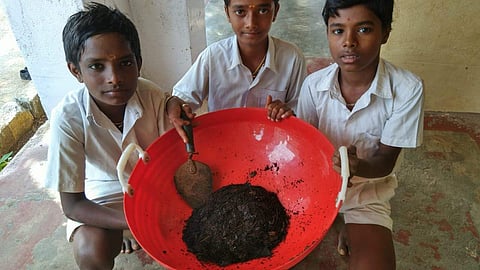

Government programmes, like Swachh Bharat, are not enough to keep our country clean on their own. Individuals have a role to play too, opines Shamsundar Subbarao who is an Associate Professor in the Department of Mechanical Engineering at the National Institute of Engineering (NIE), Mysuru. When we ask him what more he thinks individuals should do, he states, "Segregate the waste in your house and compost it. This can greatly reduce the waste that ends up in our landfills." To enable this in the community, the NIE's Centre for Renewable Energy and Sustainable Technologies (NIE-CREST) - where Prof Shamsundar is the Head and Chief Coordinator - was set up to deploy renewable energy-based efficient systems like kitchen waste biogas plants, bio-diesel, solar energy, rain water harvesting and fuel efficient cook stoves to the people of the region.
NIE-CREST has two different programmes to create awareness on zero waste production - one to solve the waste management problem through technology and the other to reach out to the communities. Under the 'Solving the waste management problem through technology' programme, NIE-CREST recently conducted a Do-It-Yourself (DIY) Waste into Compost workshop for engineering students a couple of weeks ago. This led 40 engineering students from NIE and Rajkiya Engineering College, Banda in Uttar Pradesh to work together to develop and install Aerobic Waste Composters in two Mysuru schools - Arivu Vidya Samsthe and Kaliyuva Mane School.
Prof Shamsundar says, "We thought schools would be a really good place to install this composters because when children are taught to compost waste, they will go home and spread the word among parents and elders. Our aim is to install them in government or NGO-run schools. Hence, we chose Arivu Vidya Samsthe from Mysuru city and Kaliyuva Mane located in a rural area near Mysuru. We taught children and teachers about segregating wet waste, dry waste and hazardous waste (e-waste), and why they need to be segregated. Our mantra is 'Reduce, Reuse, Recycle and Refuse' and we are trying to implement it. Today, many schools provide sanitary napkins to girl students but unfortunately, they are not being taught correct disposal methods. Unfortunately, the green waste gets mixed with this and everything becomes hazardous. Hence, educating children about segregation becomes very important and I think this method is a very efficient way of doing it"
The entire awareness process is carried out by a team of Engineering students along with Prof Shamsundar. Explaining the categorisation of green waste, brown waste and bacteria, he says, "Wet waste includes leftover food, rotten vegetables or fruits, eggs and so on, which falls into the category of green waste; dry leaves falls into the category of brown waste and bacteria is nothing but the Effective Microorganisms (EM) solution. It is bacteria that helps in composting the waste and we teach them how to prepare this wonder solution. One has to use cow dung to prepare the EM solution and around 200 litres of solution is priced at `40."
Aside from this, the Engineering students also teach the students how to use the Aerobic Composter. And what happens to the organic manure produced from this waste at schools? "The organic manure that they produce is used for gardening purposes in the school itself. Mysuru has a population of 12 lakh people and we collectively produce 400 tonnes of waste every day. But by composting waste at schools, children are learning the secret of zero waste management. They now make sure that the wet waste and dry leaves don't go to the city corporation or village panchayat, which finally ends up at our landfills," says Prof Shamsundar, whose students are designing two more aerobic composters that will be installed in other chosen government schools.
